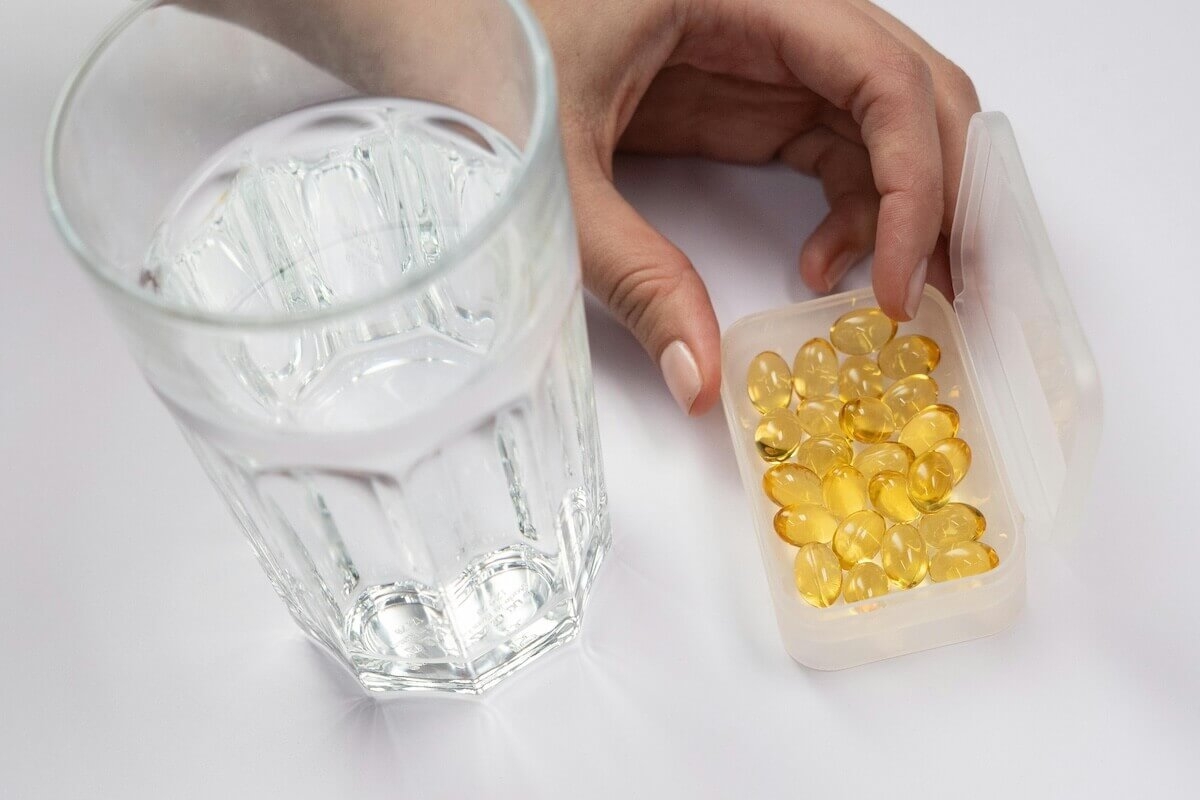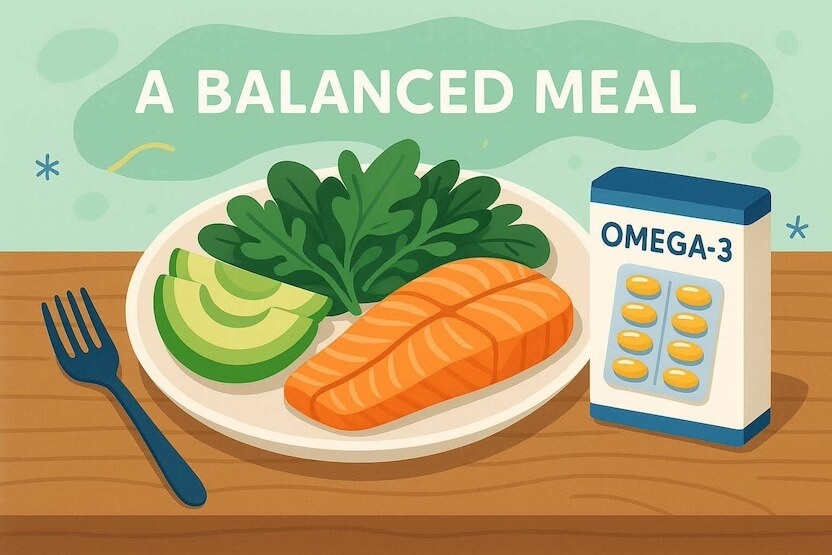Last update: July 15, 2025
9 minute read
How to Add Omega 3 to Your VitaRx Pack: A Complete Guide to Personalized Supplementation and Optimal Health Benefits
Learn how to add omega-3 to your VitaRx pack effortlessly. Discover personalized benefits, quality tips, dosage guidance, and convenience in daily omega-3 supplementation.

By Derick Rodriguez, Associate Editor
Edited by Dr. Dimitar Marinov, MD, RDN, PhD

Omega-3s get a lot of hype, but is it deserved? Science says yes, especially for heart health. There’s also some evidence for brain and energy benefits. Since your body can’t make them, how do you ensure you’re getting enough?
The answer lies in making supplementation effortless. With high-quality omega-3 supplements from VitaRx, it’s simple to include effective doses of EPA and DHA into your daily routine—no hassle, no fishy aftertaste. Let's explore how omega-3s can change your wellness, one personalized pack at a time.
First, let’s review what omega-3s are and why they matter.
Key takeaways
- Personalize your pack: Complete a health quiz and add omega-3 supplements tailored to your health needs
- Choose quality: Select omega-3 products with high EPA and DHA concentrations sourced from sustainably caught fish for purity and potency
- Stay consistent: Use convenient single-serving soft gels included in your VitaRx pack to support daily omega-3 intake easily
Understanding omega-3 fatty acids
Omega-3s aren't just buzzworthy supplements. They're foundational nutrients critical to many functions in your body. However, because your body can't make omega-3s, you need to get them from your diet or supplements.
VitaRx Tip
Omega-3 fatty acids are considered essential fats because they can’t be made by mammals and need to be obtained from your diet.
Now that we've covered their essential role, you might also be wondering: What specifically makes omega-3s "essential"?
"Essential" means your body can’t create them on its own, and lacking them can eventually lead to health issues. That's why you need to get them from food or supplements for overall health.
Types of omega-3 fatty acids
There are several key players you need to know. EPA (eicosapentaenoic acid) and DHA (docosahexaenoic acid) mainly come from oily fish like salmon, mackerel, sardines, and anchovies.
ALA (alpha-linolenic acid) is found mostly in plant foods like flaxseed and walnuts. While your body can convert ALA into EPA and DHA, the conversion rate is relatively low. That makes direct supplementation more effective in most cases.
But wait—does that mean vegetarians or vegans can't get enough EPA and DHA?
It's more challenging, but not impossible. Algae-based supplements are a vegan source of DHA and often EPA, offering a plant-powered solution for people who don’t eat fish.
Table: Omega-3 Types and Their Sources
Omega-3 Type | Primary Sources |
|---|---|
ALA | Flaxseed, chia seeds, walnuts |
EPA | Fatty fish (sardines, herring) |
DHA | Fatty fish (salmon, mackerel), algae |
For a quick reference, here are some foods and their estimated omega-3 content:
Food | Omega-3 Content (per serving) |
|---|---|
Mackerel | 2,000 mg |
Salmon | 2,150 mg |
Sardines | 1,463 mg |
Flaxseed | 2,350 mg (ALA) |
Chia seeds | 5,050 mg (ALA) |
Walnuts | 2,570 mg (ALA) |
Including a combination of these foods ensures a broader intake of both marine and plant-based omega-3s. Still scratching your head about the differences between ALA, EPA, and DHA?
- ALA: Plant-based, poorly converted to EPA & DHA.
- EPA: May help balance immunity/ inflammation.
- DHA: May help balance immunity/inflammation; Important for brain and eye function.
Health benefits of omega-3s
Clinical trials show omega-3 intake can lower triglycerides by roughly 15–30 %, and some studies suggest—but don’t conclusively prove—potential improvements in working-memory scores in adults.
Omega-3s may modestly lower blood pressure, could help support normal heart rhythms, and contribute to joint comfort. These essential fatty acids help build every cell in your body. They’re especially important for the health of your heart, brain, and eyes.
VitaRx Tip
Omega-3 fatty acids help keep your heart healthy and protected against stroke, and also support brain, eye, and immune system functions.
Wondering exactly how omega-3s help your heart and brain?
- They lower triglycerides and blood pressure.
- They reduce plaque buildup in arteries.
- They help your brain's neurons communicate better, lifting mood and memory.
Why add Omega-3 to your VitaRx pack
We all know that staying consistent with supplements can be tough when they're scattered around the medicine cabinet or kitchen. VitaRx solves this problem with simple, personalized packs, making supplementation convenient and raising the odds we’ll actually stick with it each day.
But wait—what if you already eat fish a few times each week? Supplementation fills any nutritional gaps and helps ensure daily, consistent intake—even if your dietary routines change.
Personalized health benefits
With VitaRx, you can customize your supplement packs to fit your specific needs and health goals. Adding omega-3 supplements makes sure we’re actively targeting cardiovascular health, mental focus, and joint comfort in your unique routines.
The majority of health experts recommend a minimum of about 250 mg of EPA plus DHA per day for adults, with intakes up to around 2 g/day sometimes suggested for individuals with specific cardiovascular concerns.
Here's why that matters: By changing your supplement plan, you avoid unnecessary or repeated pills and only focus on what helps your specific health needs.
Convenience and consistency
Packing omega-3 into your daily, personalized dose means easy consistency. Consistent supplementation is key, and VitaRx makes it simple so you can maintain consistency easily.
Research has shown that including omega-3s in a daily routine can lower inflammation and reduce triglycerides, which is linked to lower long-term heart disease risk.
Still curious about why consistency matters? Omega-3s build up in cell membranes over time. Regular intake helps maintain steady levels for ongoing protection, instead of a short-term boost.
— Dr. Dimitar Marinov, MD, RDN, PhDBy adding VitaRx’s enteric-coated omega-3 softgels (300 mg EPA/200 mg DHA) to your personalized pack, you secure a hassle-free daily dose that supports heart, brain, and joint health. Single-serving formats ensure consistent bioavailability and compliance, while third-party purity testing guarantees you get the full, contaminant-free benefits every day.
How to add Omega-3 to your VitaRx pack
We’ve made the whole process simple with three straight-forward steps, making health upgrades quick and seamless.
Step 1: Take the health quiz
First, you'll complete our quick, 3-minute health quiz. It's designed to help us understand your health profile and personalize supplement suggestions just for you.
What kind of questions will the quiz ask? Topics include diet, lifestyle, medical history, and your health goals—so suggestions fit your unique needs.
Step 2: Customize your pack
After finishing your quiz, just go to the Omega-3 Fish Oil product page and click 'Add to Pack.'
Each single-serving soft gel contains 1,000 mg fish oil, delivering a solid mix of 300 mg EPA and 200 mg DHA. High-quality ingredients meet ultimate convenience.
Table: VitaRx Omega-3 Fish Oil Softgel Content
Serving size | Fish Oil | EPA | DHA |
|---|---|---|---|
1 Softgel | 1,000 mg | 300 mg | 200 mg |
Still wondering—does fish oil taste or smell bad? Thanks to enteric coating, you won’t get the fishy aftertaste or burps some people get with regular fish oil.
Step 3: Review and subscribe
Once you’ve customized your pack, hit the cart icon to review and check out quickly. VitaRx will ship your personalized pack monthly, so you never miss a daily dose.
What if you want to change or pause your pack? Log in anytime to change your supplement choices, change amounts, or skip a shipment—no stress or hassle.
Omega-3s help your body work
Omega-3 fatty acids help control important body functions, like the balance of hormone-like substances in your body.
Choosing the right omega-3 supplement
Quality counts, especially for omega-3s. Not all products are created equal.
Key factors to consider
Look for products—like VitaRx Omega-3 Fish Oil—that label their high concentrations of EPA and DHA and source from sustainably-caught fish. High-purity supplements go through molecular distillation and third-party testing to ensure contaminants (like heavy metals or PCBs) don't sneak in.
Not sure what "purity" really means here? High-purity omega-3s are filtered to remove heavy metals and contaminants. Always check for third-party testing labels for true peace of mind.
VitaRx's Omega-3 Fish Oil
VitaRx omega-3 supplements use wild-caught fish and strict quality standards for purity and potency. Our supplements feature enteric coating, so you don’t need to worry about a fishy aftertaste or awkward burps—a common issue with lower-quality fish oils. The product is non-GMO, gluten-free, and free from common allergens like dairy, eggs, nuts, peanuts, and shellfish.
VitaRx Tip
Sourcing from wild-caught fish, not farmed, helps save ocean health and delivers richer omega-3 profiles, all while supporting responsible fishing practices.
Including omega-3 into your daily routine
Ready to take action and get maximum value from omega-3?
Best dosage and timing
Many health authorities suggest 250–500 mg of combined EPA and DHA daily for generally healthy adults; one VitaRx omega-3 soft gel provides about 500 mg total (300 mg EPA and 200 mg DHA), which falls within this range. Take it with a fat-rich meal for the most absorption.
But wait—why take it with a meal containing fat? Omega-3s are fat-soluble. Eating them with dietary fat increases absorption into your bloodstream, making each dose more effective.

Storage and handling tips
Store your omega-3 supplements away from sunlight, heat, and humidity. VitaRx makes this process simpler by giving your daily dose in convenient packs stored neatly in your dispenser box.
Fish oil, like other food oils, comes with a set expiration date, so check your packaging for freshness.
Curious what happens if fish oil goes bad? Spoiled fish oil may have a strong, rancid odor or taste. Using it past its expiration date can reduce effectiveness and may upset your stomach.
Frequently asked questions (FAQ)
Here are some of the most frequently asked questions about omega-3 supplements.
Final thoughts
Omega-3 fatty acids—EPA, DHA, and ALA—aren’t fads; they're essential nutrients important for optimal cardiovascular, cognitive, and joint health. Convenient supplementation, like VitaRx’s personalized omega-3 packs, makes getting your daily dose straightforward, consistent, and effective. Are you giving your body the omega-3 support it truly deserves?
Sources and references
Editor

Derick Rodriguez
Derick Rodriguez focuses on editing health and wellness-related content. With over half a decade of experience in the digital realm, Derick has developed a unique skill set that bridges the gap between complex health concepts and accessible, user-friendly communication. His approach is deeply rooted in leveraging personal experiences and insights to illuminate the nuances of health and wellness topics, making them more approachable and empowering readers with knowledge and confidence.
Fact checker

Dr. Dimitar Marinov
Dr. Marinov has years of experience in scientific research and preventive and clinical medicine. His publications in peer-reviewed journals are on nutritional status, physical activity, and musculoskeletal disorders among adolescents.
At VitaRx, we're not just passionate about our work — we take immense pride in it. Our dedicated team of writers diligently follows strict editorial standards, ensuring that every piece of content we publish is accurate, current, and highly valuable. We don't just strive for quality; we aim for excellence.
Related posts
While you're at it, here are some other relevant articles you might be interested in.

Get your personalized vitamin recommendations in less than
5 minutes.
Get your personalized vitamin recommendations in less than
5 minutes.






